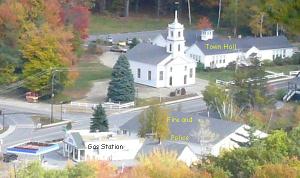
|
19A002 The Memory Hole by Jim Davies, 1/8/2019
One of George Orwell's brilliant images was of how his hero Winston Smith was employed by the government to alter history. Stories published in the past were sometimes to be "disappeared", and Smith's job was to do the disappearing, by placing them in a memory hole. In the Internet era with control of search engines being concentrated in the hands of pro-government activists, such alteration of the past is much easier than it was in 1948 - or in 1984. Last month I encountered just such a case. I'd made passing reference to it in my newspaper column here at the time, and remembered that in 1993 some guy had shot dead some ladies working in the Town Hall at Newbury, NH, and wanted to refresh my memory on the details. Even Ixquick couldn't find any. I lived nearby at the time and clearly recall how within 30 minutes Governor Merrill had been rushed up the I-89 to visit the scene, and how all the State's newspapers had used their whole front pages to tell the story. It was a big deal. Yet now, a quarter century later, there's not a whisper of it. The Concord Monitor and Union Leader archives revealed no on-line trace of the tale. Outside the now-remodeled Town Hall there's a stone memorial to the two employees killed - but there's no summary of why the shooter shot, nor even of his name. That's all the more curious, for his father, who died a year ago at 94, was for many years a prominent politician in the town; its mayor, or "first selectman" for a time, and owned the town's only gas station, close by. So before the story vanishes for all time, I thought to make this record; though I still don't know all the details. On November 1st 1993, John Albro walked in to the Town Hall carrying some assorted guns from his collection. He was complaining, about the oft-repeated refusals of the Zoning Board to accept his requests for variations on the use of parcels of land he had bought, so that he could make a living; some of the ladies would have conveyed the bad news to him about these refusals, but were not responsible for making them. Then he shot two of those messengers dead, then killed himself. Evidently, he had been frustrated by the Zoning Board once too often, and he snapped, and decided to end it all. Sadly, he targeted not the individuals who had made his life a misery but just the people who had passed on their decisions; one of them had held her job for only two weeks. Now, it may well be that John Albro was several cards short of a full deck, and he sure was short that November 1st, after being so ill-treated by the Zoning Board. But that happens; while our race's median IQ is 100, some are way above that figure and some, way below it. In the immortal words of Rodney King, we all need to get along. And a system of laws that in their nature must be inflexible is not the way to facilitate that; Albro's land-use ideas may have been somewhat off the wall, but he was entitled to try them out, and discover whether the market would buy them. But Nanny said No. So two of Nanny's messengers died. Had a zero-government free market been operating, they would not. But nor would they have been working in a government office. As far as I could discover, the names and addresses of the Zoning Board members who repeatedly denied Albro's requests were never published. Perhaps they could have been found listed in the town's annual report for 1993; I don't know if any copies of that remain in existence but suspect they were scrapped. Nor do I know the nature of any influence Albro's father may have tried to bring, and think that that too was never reported. Possibly, the refusals had their origin in some kind of intra-government feud between the Albros and their rivals; but found no account of that in the journals of any fearless investigative reporter. The whole subject has been hushed up. Winston Smith has done his work. Naturally, government people don't like it when stories about resistance to their rule hit the headlines, so that's hardly surprising; there might be a rash of violence against their arrogant agents as portrayed for example in the novel Unintended Consequences, reviewed in this ZGBlog. That, in turn, might well deter people from working for government, bringing resignations and reluctance to be hired. Such would be an excellent outcome, but it comes at far too high a price; there is no need at all for bloodshed for the reasons to avoid such employ, as laid out on the QuitGov site, are very adequate on their own.
|
|
||||||||||||||||||||||||||||||||||||||||||

 For about ten minutes he spoke to the clerks at their desks, punctuating his remarks by shooting randomly into the walls and ceiling. The police station was under 100 yards away, but nobody there heard or came. Each clerk had a telephone, but all were too petrified to use it; and by chance, no incoming call was received.
For about ten minutes he spoke to the clerks at their desks, punctuating his remarks by shooting randomly into the walls and ceiling. The police station was under 100 yards away, but nobody there heard or came. Each clerk had a telephone, but all were too petrified to use it; and by chance, no incoming call was received. 








